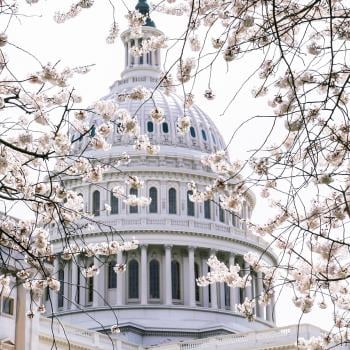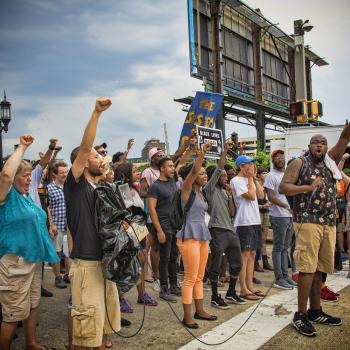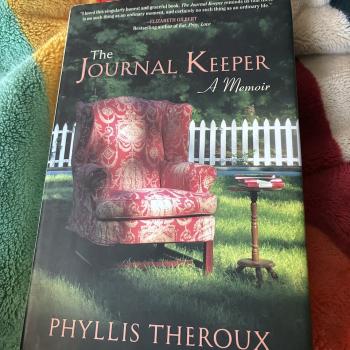Perhaps like preachers across America, I couldn’t help but point folks towards inaugural poet Amanda Gorman’s prophetic words, alongside the lectionary readings. Please, pre-order copies of her poem, “The Hill We Climb,” her poetry book, The Hill We Climb and Other Poems, or her children’s book, Change Sings, if you haven’t already, and directly support this young Black woman’s work. Otherwise, here’s a link to yesterday’s sermon – text below. Enjoy!
—

On Wednesday morning, my husband, James, and our two young sons, Canon and Theo, along with the new pandemic puppy, Rufus Lucky Meredith, gathered together on the couch with our coffee and our bowls of cereal. All five of us were glued to CNN, ready to usher in a new President, as well as the newest Madam Vice President. I remember how my eyes filled with tears, time and time again, how my husband let out multiple yeses and amens, how our six-year old whispered, “I hope I lose my front tooth today, Mama, because wouldn’t that just make it the best day ever?”
It was an emotional morning, to be sure, but the scene I’ve come back to again this week was not the swearing-in’s or the hallowed singing or even the recitation of prayers: but it was words of hope and community and healing spoken by the young inaugural poet, Amanda Gorman.
And call me crazy, but it’s like she wrote her poem with today’s lectionary readings in mind:
We’ve braved the belly of the beast,
We’ve learned that quiet isn’t always peace,and the norms and notions
of what just is
isn’t always just-ice.
Now, maybe I’m putting on my former English teacher hat (true story), but when Gorman said, “we’ve braved the belly of the beast,” even though she was speaking of the pain of a nation, I couldn’t help but see that her words are a reflection of today’s reading in Jonah, of a man named Jonah, whom a whale swallowed just two chapters before God came to him with a message for the people of Nineveh.
And when she then said, “We’ve learned that quiet isn’t always peace, and the norms and notions of what just is isn’t always just-ice,” I thought about today’s psalm, how it is one of lament and praise, thanksgiving and wisdom and exhortation too. It is, thoroughly a psalm that leans into the God who is our refuge, our safe place, our dwelling and our comfort.
And then, of course, we have our gospel reading, which starts with a couple of announcements. John the Baptist has been arrested (because he opposes King Herod marrying his brother’s wife), but we are not to worry, because in the next breath, Jesus declares the good news of God. He says, “The time has been fulfilled, and the kingdom of God has come near; repent, and believe in the good news” (v. 15). It’s not until next section, which is almost entirely action-oriented but for a single sentence – “Follow me and I will make you fish for people” (v. 17) – that we begin, maybe, to connect WHO Jesus is with WHAT he just said. Because when Simon and his brother Andrew, and James, son of Zebedee and his brother John, say YES to this invitation and leave everything they’ve ever known to follow the God-man, real change begins to occur.
After all, invitation is at the heart of this passage – just as invitation to embrace hope and community and healing, no matter WHERE you stand on the political spectrum, lives at the heart of Wednesday’s poem.
If we’re to live up to our own time,
then victory won’t lie in the blade.
But in all the bridges we’ve made,
that is the promise to glade,
the hill we climb.
If only we dare.
It’s because being American is more than a pride we inherit,
it’s the past we step into
and how we repair it.
And I don’t know about you, but I’m ready to say yes to an invitation of healing and repair, which is not all that different from the invitation Jesus extended to a bunch of stinky, smelly, everyday fishermen. As one theologian said about this passage, here “Jesus is inviting common folk to join him in his struggle to overturn the existing order of power and privilege” (link here). To put it in layman’s terms, Jesus is inviting us to notice the poor and the dispossessed, to open our eyes to really begin to see those whom we’ve excluded and those who’ve been rendered invisible.
Jesus’ invitation, after all, is an invitation to see …and I can’t help but wonder if it’s the same for you and me.
A lot of the work that I do involves invitation: An invitation to parents and caregivers to talk about race with their kids about race. An invitation to those who identify as white to wrestle with privilege and with white supremacy – to look at the stories of their pasts and of the present, to be okay with being uncomfortable, and to lean into, listen to and learn from the voices of our Black and brown brothers and sisters whom we’ve long discounted.
Equally, I give invitations to the church, for all of us under this beautiful, bountiful umbrella of grace to recognize and honor the particularities of our personhood, which is to say the glorious differences that make us us, including those differences of race and culture and ethnicity, as well as differences of personality and gender and sexual identity, to name a few. Because when we begin to recognize and honor these particularities, we move toward being the Beloved Community God intentioned us to be.
And I don’t know about you but I’m ready: I’m ready for hope, like I’m breathless, eager, desperate for it. I’m ready for community. I’m ready for healing. I’m ready for those of us who are white to really wrestle with our whiteness and to lay down the power that we hold and to be okay with being on journeys of racial awareness, even if they don’t make us feel good right away – and for my brothers and sisters of color, I’m ready for the church and for our country to be a place that really, actually lives into the ideals Jesus himself preached and promised.
So friends, the time is now – which actually returns us to today’s Gospel reading and to Gorman’s poem as well. She ends, as you may have seen, with these three lines:
When the day comes we step out of the shade,
aflame and unafraid,
the new dawn blooms as we free it.
For there is always light,
if only we’re brave enough to see it.
If only we’re brave enough to be it.
If you think about it, these lines, encouraging us to have the bravery to see it and to be it, is an immediate kind of invitation – which is exactly what Jesus extended to the first disciples when he said, “The time has been fulfilled, and the kingdom of God has come near; repent, and believe in the good news” (v. 15). Jesus’ words were a declaration, yes, of truth and of himself, but they were also an announcement of time – of Kairos, meaning God’s time, meaning the present moment, which is now.
The time is now. The invitation is now. Are you ready to heed this invitation to bravery, to being brave enough to truly be the change we wish to see in the world and to those things that really will bring God’s justice to this earth now and in the end?
The time and the invitation is now. I do hope you’ll join me.
—
What say you? This weekend’s lectionary readings, Amanda Gorman’s words? What did it spark in you? (Also, be sure to follow the above links to directly support Amanda Gorman’s work).
*Post contains Amazon Affiliate links













